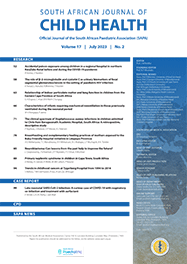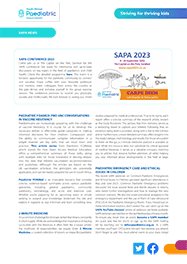Research

Risk profiles of infants ≥32 weeks’ gestational age with oropharyngeal and oesophageal dysphagia in neonatal care
Abstract
Background. Infants in neonatal intensive care are at risk of swallowing difficulties, in particular oropharyngeal dysphagia (OPD) and oesophageal dysphagia (OD). OPD is treated by speech-language therapists while OD is managed by doctors. Diagnosis of dysphagia is a challenge as equipment for instrumental evaluations is not readily available. Additional information to guide clinical assessment may be valuable.
Objective. To determine whether risk profiles of infants (≥32 weeks’ gestation) in a neonatal intensive care unit (NICU) and diagnosed with OPD or OD were distinctly different from one another.
Methods. Non-probability convenience sampling was used to select 49 participants. Based on modified barium swallow (MBS) examinations, three groups of participants were identified: no dysphagia (n=11), OPD (n=13) and OD (n=25). Clinical data were collected to investigate associations between risk profiles and type of dysphagia.
Results. Factors such as gestational age, birth weight, poor weight gain and Apgar scores showed no association with either type of dysphagia in the sample of infants with a mean gestational age of 35.53 weeks. Increased NICU stay, increased chronological age, problematic breastfeeding and use of tube feeding showed an association with OPD. Three risk factors, namely intrauterine growth restriction, premature rupture of membranes and nutritive sucking difficulties were associated with OD.
Conclusion. Risk profiles associated with the two types of dysphagia may guide NICU personnel and speech-language therapists, especially in settings where no MBS equipment is available.
Authors' affiliations
C Pike, Department of Speech-Language Pathology and Audiology, Faculty of Humanities, University of Pretoria, South Africa
M Pike, Department of Speech-Language Pathology and Audiology, Faculty of Humanities, University of Pretoria, South Africa
A Kritzinger, Department of Speech-Language Pathology and Audiology, Faculty of Humanities, University of Pretoria, South Africa
Esedra Krüger, Department of Speech-Language Pathology and Audiology, Faculty of Humanities, University of Pretoria, South Africa
M Viviers, Department of Speech-Language Pathology and Audiology, Faculty of Humanities, University of Pretoria, South Africa
Full Text
Cite this article
Article History
Date published: 2016-06-29
Article Views
Full text views: 1503

.jpg)



Comments on this article
*Read our policy for posting comments here